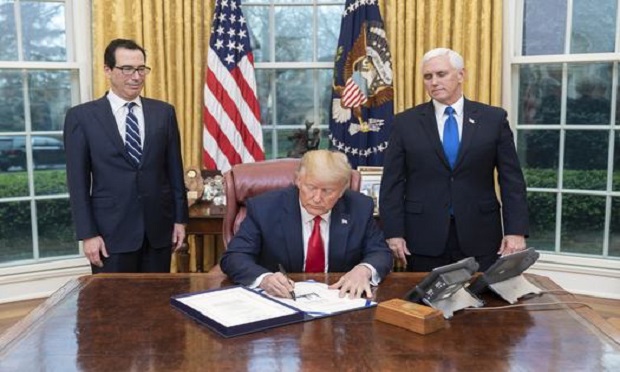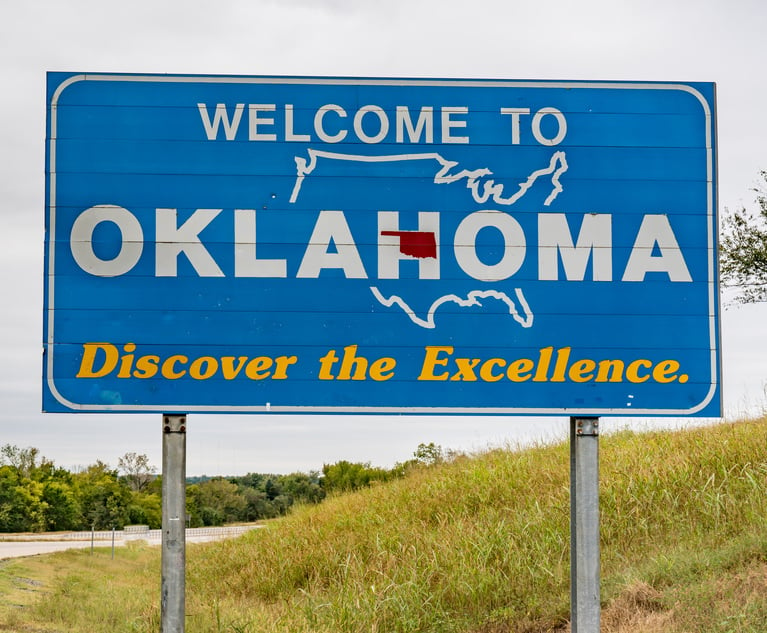 President Donald J. Trump, joined by
Vice President Mike Pence and Treasury Secretary Steven Mnuchin,
signs H.R. 6201, the Families First Coronavirus Response Act on
Wednesday, March 18, 2020, in the Oval Office of the White House.
(Official White House Photo by Shealah Craighead)
President Donald J. Trump, joined by
Vice President Mike Pence and Treasury Secretary Steven Mnuchin,
signs H.R. 6201, the Families First Coronavirus Response Act on
Wednesday, March 18, 2020, in the Oval Office of the White House.
(Official White House Photo by Shealah Craighead)
Editor's Note: At the start of each month, we publish insurance legislative and regulatory news and updates from around the nation.
National updates
President Trump signed the Families First Coronavirus Response Act (FFCRA). The law seeks to assist employees (from employers with fewer than 500 employees) who are impacted by the COVID-19 outbreak by providing sick leave, expanded unemployment insurance, food assistance, and free testing for the virus.
In early March, the president also signed a $7.8 billion emergency coronavirus spending bill. The measure reimburses state and local governments for the cost of preparing for and fighting the virus. In addition, it allows for Medicare to spend $500 million telehealth programs.
USDA's Risk Management Agency (RMA) is authorizing additional flexibilities due to the coronavirus. The added flexibilities include: enabling producers to send notifications and reports electronically, extending the date for production reports and providing additional time and deferring interest on premium and other payments. "Crop insurance will continue to support farmers through the challenges ahead, and our RMA team is here to support them," RMA Administrator Martin Barbre said in a statement. "We are working with the AIPs to continue to deliver crop insurance and to respond to farmer needs."
On March 27, President Trump signed the Coronavirus Aid, Relief and Economic Security (CARES) Act, the largest stimulus package in U.S. history. According to Bloomberg, the package provides about $500 billion in loans and other assistance for major companies; $350 billion to aid small businesses; and $117 billion for hospitals. Additionally, the measure includes $1,200 direct payments to middle- and low-income American adults, plus $500 for each child.
The U.S. Department of Transportation Office of Drug and Alcohol Policy Compliance issued guidance on conducting drug-and-alcohol testing on DOT-regulated employers, employees, and service agents. On its website, the DOT stated it is "committed to maintaining public safety while providing maximum flexibility to allow transportation industries to conduct their operations safely and efficiently during this period of national emergency." The new guidelines include direction for DOT-regulated employers to make a reasonable effort to locate resources needed to continue conducting testing requirements in addition to other instructions.
State updates
Virginia passed HB 617, which will direct the state's Workers' Compensation Commission to study the implications of covering repetitive motion injuries in the state workers' compensation system.
Public adjusters in Wisconsin now have to register with the Department of Insurance every two years under a new law.
SB 2848 in Tennessee is pending that would make it unlawful to prepare a property and casualty insurance certificate with false or misleading information.
Governor Gretchen Whitmer of Michigan signed House Bill 5174 into law. The new law eliminates the prescriptive $64 cap on surplus lines agent policy fees has been eliminated for commercial surplus lines policies and for personal surplus lines policies, replaced with a cap of $100 or 10%, whichever is greater.
On March 11, the California attorney general published additional revisions to its proposed regulations for the California Consumer Privacy Act (CCPA). The three key changes proposed include the removal of the opt-out button; the removal of the IP address "link" requirement; and additional required disclosures to consumers in the privacy policy.
Lawmakers in Oklahoma passed two bills modifying the states workers' comp market:
- HB 384: If signed into law, this bill would make it a felony if an injured worker failed to report a material change in income to the state. The crime could be punishable by imprisonment, fines, or both.
- SB 1818: Changes the list of incidents that are non-compensable under workers' compensation to include idiopathic injuries.
Senate Bill 7843 was introduced in New York. The bill would amend the state's workers' comp law to require employers to provide documents to employees in their native language. If made into law, the bill would "prohibit cases from being closed without a hearing or written stipulation, requires a stenographic record of all hearings held and requires minutes and decisions to be provided to the injured worker in their native language."
House Bill 4361 in West Virginia would update the state's fraud law to include increased penalties for convicted fraudsters; the creation of a fund for forfeiture recoveries and more.
Florida passed HB 7097 that reduces the surplus lines premium tax rate from 5% to 4.94% and eliminates the taxation of multistate surplus lines policies based on the rate where the risk is located.
SB 2422 passed in the Hawaii Senate. the bill aims to crack down on storm-chasing roofers by prohibiting them from offering to pay insurance deductibles.
Commissioner Jim Donelon of Louisiana issued Emergency Rule 38 to help address the public health emergency brought on by the coronavirus. The rule provides Louisiana residents making an application for a producer license for lines of insurance with a pre-licensing requirement an opportunity for temporary licensure.
"I have issued Emergency Rule 38 to address the interruption of domestic insurance producer's ability to sit for licensing exams or submit fingerprints due to the stay at home order currently in place throughout Louisiana," said Donelon in a statement. "This rule provides guidance for obtaining temporary licensure, defining eligibility for this temporary license, the duration of temporary licenses and the process for conversion of same to permanent licenses under this order."
A New Jersey bill is in the works that would compel insurance companies to cover claims by the state's small business owners for business interruption resulting from COVID-19. A-3844, sponsored by Assembly members Roy Freiman (D-Hunterdon/Mercer(, Louis Greenwald (D-Camden), and Annette Chaparro (D-Hudson), failed to reach a floor vote but remains a work in progress.
Massachusetts, Pennsylvania, New York and Ohio also introduced bills that will require insurers to cover coronavirus-caused business interruption losses even when losses fall outside the written policy language.
A number of states have passed legislation in response to the coronavirus (COVID-19) while others have legislation pending. The states that have enacted laws include:
- Alabama: HB 186 makes supplemental appropriations eligible to be used for coronavirus preparedness and response activities.
- Alaska: HB 206 appropriates $4,091,100 from the general fund to the Department of Health and Social Services if the cost of responding to and mitigating the risk of a COVID-19 outbreak in the state exceeds the amount appropriated through federal receipts.
- Arizona: SB 1051 appropriates $55 million from the budget stabilization fund to the public health emergency fund.
- California: SB 89 appropriates $500 million for purposes related to COVID-19. Additionally, it allows for additional appropriations in increments of $50 million but not to exceed $1 billion. SB 117 appropriates $100 million for local education agencies to purchase protective equipment and supplies and to cover labor-related costs of cleaning school sites.
- Georgia: HB 792 provides $100 million to combat the spread of the coronavirus.
- Iowa: SB 2408 makes supplemental appropriations available and waives the instructional time requirement for schools that close.
- Maine: HB 1549 allows the State Controller to transfer up to $11 million from the Reserve for General Fund Operating Capital to a COVID-19 response fund. SB 676 provides for reimbursement of case management services and expands telehealth services to include case management. SB 789 gives the governor temporary powers during the state of emergency declared as a result of the coronavirus outbreak. HB 1516 makes appropriations for the expenditures of the general fund as well as one-time funding for COVID-19 response.
- Massachusetts: HB 4502 appropriates $95,000 for the Executive Office of Education to contain, treat and prevent the coronavirus. HB 4561 includes a measure that reserves $15 million to support the commonwealth's response to the outbreak. SB 2599 waives the one week waiting period for unemployment benefits.
- Maryland: SB 1079 gives the governor powers to transfer up to $50 million to fund costs associated with the coronavirus. SB 1080 permits the governor to take certain actions in a state of emergency, such as prohibiting cost-sharing by carriers for disease testing, immunization and any associated costs, and more.
- Minnesota: SF 3813 allow the commissioner of management and budget to transfer $20 million from the general fund to the public health response contingency account. SF 4334 transfers $50 million for deposit in the public health response contingency account and $150 million to the health care response fund
- Mississippi: HB 1647 permits local governmental entities and school districts to grant administrative leave with pay to employees in the event of certain disasters or emergencies.
- New Jersey: AB 3840 requires school districts to provide meals or meal vouchers to students eligible for free or reduced-price school meals during school closures from the coronavirus outbreak. AB 3845 authorizes the Economic Development Authority to make grants during periods of emergency. AB 3865 limits the return of items purchased from retail food stores during a state of emergency declared in response to COVID-19. SB 7919 temporarily expands the definition of disaster in state law to include disease outbreak and allows for $40 million to be appropriated to responding to the outbreak of coronavirus disease.
- New York: SB 7919 temporarily expanded the definition of diaster to include disease outbreaks. SB 8091 provides provisions for certain employee benefits when an employee is subject to a mandatory or precautionary order of quarantine or isolation due to COVID-19.
- South Carolina: HB 4014 makes a supplemental appropriation for use by the Department of Health and Environmental Control for the state's response to COVID-19.
- Washington: HB 2965 authorizes an appropriation of $175 million from the state's budget stabilization account to the state's disaster response account as well as $25 million for expenditure into the COVID-19 unemployment account. HB 2739 includes a provision of shared leave for employees in isolation or quarantine. SB 6189 Clarifies eligibility for School Employees' Benefits Board coverage of substitute teachers and school employees during quarantine or school closures due to COVID-19.
Related:
© 2024 ALM Global, LLC, All Rights Reserved. Request academic re-use from www.copyright.com. All other uses, submit a request to [email protected]. For more information visit Asset & Logo Licensing.








